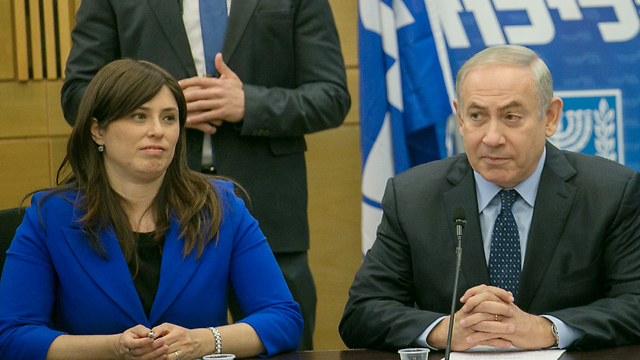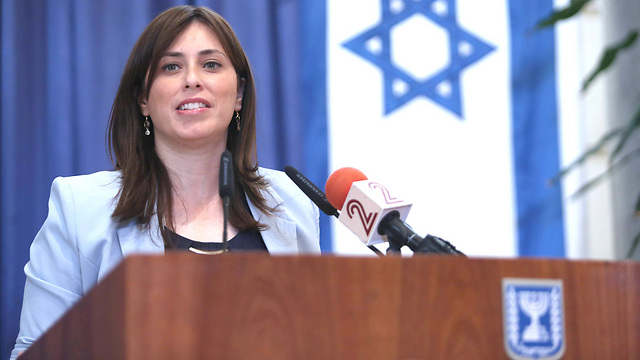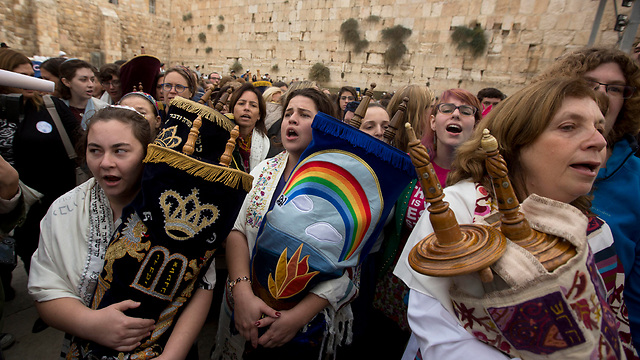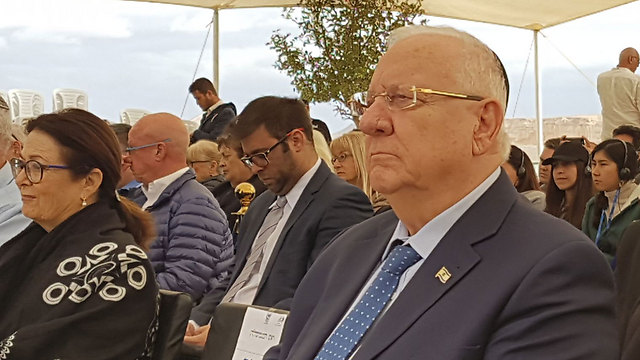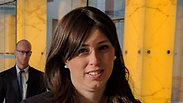
PM pans Hotovely's comments on US Jews having 'convenient lives'
Netanyahu repudiates remarks made by his deputy foreign minister, who says US Jews don’t understand 'the complexity of the region' because they don’t fight in any army or experience rocket attacks; Hotovely also claims liberal Jews 'not even interested in going to the Kotel' but merely seek recognition.'
Seeking to distance himself from Hotovely’s comments, Netanyahu stepped in to clarify matters, issuing a statement against what were described as “offensive remarks.”
"The Jews of the Diaspora are dear to us and are an inseparable part of our people," Netanyahu said.
“There is no place for such attacks, and her remarks do not reflect the position of the State of Israel,” he added.
The comments came after Hotovely—whose speech was recently canceled at Princeton University’s Center for Jewish life by a Jewish group called Alliance of Jewish Progressive accusing her of “stating her opposition to a Palestinian state”—told i24NEWS that Jews in the diaspora struggled to grasp the realities faced by Israelis.
“There is another issue and I think the other issue is not understanding the complexity of the region. People that never send their children to fight for their countries. Most of the Jews don’t have children serving as soldiers, going to the Marines, going to Afghanistan or to Iraq,” she said in relation to the US Jewish community.
“Most of them are having quite a convenient life. They don’t feel how it feels to be attacked by rockets and I think part of it is to actually experience what Israel is dealing with on a daily basis."
Earlier in the same interview, Hotovely risked stoking further outrage among the more liberal denominations of US Jewry when she said most of the time the non-Orthodox Ezrat Yisrael plaza at the Western Wall was empty because American Jews had no interest in visiting the holy site.
She further claimed that a suggestion by the government to reserve a section for egalitarian prayer services was rejected because all the liberal streams really sought was recognition of their movements, using the Kotel as a tool to that end.
“I think it’s a very important goal to bring American Jews closer to Israel, I think this is one of my goals, but we need to be open about this,” Hotovely said.
Referring to the non-Orthodox section, Hotovely claimed, “Most of the time it’s empty. And the reason it’s empty, if you’re asking me, it’s not because they don’t like the arrangement, it’s empty because most of the time those people are not even interested in going to the Kotel.”
She praised the Israeli government for finding a solution to the crisis that ensued after the government froze in June progress on plans to construct an egalitarian section at the Western Wall to cater for the holy site’s more liberal visitors.
“The Israeli government was doing a lot in order to make sure that they can have egalitarian prayer, that women can go together with their family, that men can go together with their daughters,” she said, adding that the controversy was really of a political, rather than religious character.
“Everything is set up but they are not willing to get that because if you’re asking me this is a political matter. They want to get recognized through the Kotel issue and they are making a religious, holy place something for political dispute and I really think the solution that was offered was quite good,” she said.
Turning to the cancelation she faced at Princeton, Hotovely said she had been the victim of a “liberal dictatorship.”
“What is happened with Hillel, what is happening with freedom of speech and academic freedom, what is happening to the very basic human respect to the fact you are inviting an overseas representative of the Israeli government and you are canceling on the same day because some students don’t like my opinions—this is something really bad that’s happening under what I call the liberal dictatorship," she said.
President Reuven Rivlin also sought Thursday to mend cracks potentially left by Hotovely between Israel and US Jewry.
“I returned here from a trip to the US. I saw huge love of the Jewish diaspora for Israel. I saw the deep concern and pain from the crumbling of bridges that connect Israel with the diaspora,” Rivlin said during his speech at a state memorial for Israel’s first prime minister David Ben Gurion.
“Ben Gurion stuck to his decision to compromise, for the foundation and preservation of the connection between Israel and the Jewish diaspora,” he continued.
Referencing an agreement signed two years after Israel gained independence by Ben Gurion and the American Jewish Committee President President Jacob Blaustein, Rivlin said the former prime minister’s goal was to determine the nature of the relationship between the Jewish communities of Israel and the US.
“Israel represents its citizens only, and speaks only in their name,” Rivlin said as he listed four of the agreement’s main clauses.
“American Jews are citizens of the US and the US alone has their loyalty,” he went on. “Israel doesn't expect from American Jews to make Aliyah. No side will intervene in the political decisions of the other.”
At the conclusion of his speech, Rivlin called for Israeli and American Jews to embark on “a new path,” characterized “not by mutual criticism, but by openness, courage and frankness.”











